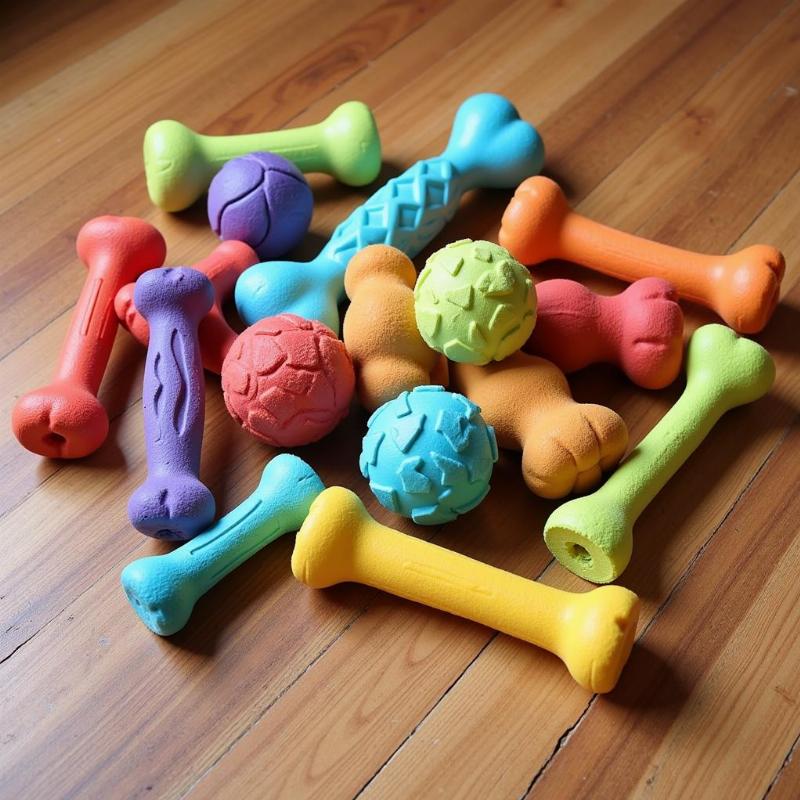Chewing is a natural behavior for dogs, but when your furry friend decides their bed is the tastiest chew toy in the house, it can be frustrating and expensive. So, how do you stop a dog from chewing his bed? This comprehensive guide will explore the reasons behind this behavior and offer practical solutions for American dog owners looking to preserve their dog’s bedding and their sanity.
Destructive chewing can stem from various factors, ranging from teething puppies to anxious adults. Understanding the root cause is crucial for implementing effective solutions. For puppies, chewing relieves the discomfort of teething. Adult dogs may chew due to boredom, anxiety, separation anxiety, or even a medical condition. Once you identify the underlying reason, you can address the behavior more effectively.
Why Does My Dog Chew His Bed?
Is your dog a puppy? If so, teething is likely the culprit. Just like human babies, puppies experience discomfort during teething and chewing helps relieve this.
However, if your dog is an adult, other factors are at play. Boredom is a common reason. A dog left alone for long periods with insufficient mental or physical stimulation might turn to chewing as an outlet. Anxiety, whether general or separation-related, can also manifest as destructive chewing. Some dogs even develop compulsive chewing habits. Finally, underlying medical conditions, such as dental pain, can cause a dog to chew excessively.
Effective Strategies to Stop Bed Chewing
Addressing the root cause is the first step. For puppies, providing appropriate chew toys can redirect their chewing instincts. Durable toys designed for teething can help soothe their gums and prevent them from targeting their bed.  Dog chew toys
Dog chew toys
For adult dogs, enriching their environment is key. Ensure your dog gets plenty of exercise and mental stimulation. Regular walks, playtime, and interactive toys can help alleviate boredom and reduce the urge to chew. Puzzle toys filled with treats can also keep them occupied and mentally engaged. Consider providing a safe space, like a crate or den, where your dog can retreat when feeling anxious.
Training and Management Techniques
Training plays a crucial role in curbing destructive chewing. Teach your dog basic commands like “leave it” and “drop it.” These commands can be invaluable in redirecting their attention away from the bed and onto a more appropriate chew toy. Positive reinforcement training, using treats and praise, is highly effective. wife first time with a dog
Management techniques can also help prevent access to the bed when you’re not around to supervise. Confine your dog to a dog-proofed area or use a crate when you’re away. This prevents them from having the opportunity to chew the bed in your absence. what to put on furniture to keep dogs from chewing
When to Consult a Veterinarian
If the chewing persists despite your efforts, it’s essential to consult a veterinarian. They can rule out any underlying medical conditions, such as dental issues or allergies, that may be contributing to the behavior. They can also offer guidance on behavior modification techniques or prescribe medication if necessary. what to do if my dogs paw is swollen
Conclusion
Stopping your dog from chewing his bed requires a multifaceted approach, addressing the underlying cause, providing appropriate alternatives, and implementing consistent training and management techniques. By understanding your dog’s needs and employing these strategies, you can create a more harmonious and less destructive environment for both of you. Remember, patience and consistency are key. With the right approach, you can help your dog learn to leave their bed alone and enjoy it for its intended purpose: a comfortable place to rest.
FAQ
- Why does my puppy chew everything? Puppies explore the world through their mouths and chewing helps relieve teething pain.
- What kind of chew toys are best for puppies? Durable rubber toys and toys designed specifically for teething are good choices.
- Can anxiety cause a dog to chew? Yes, both general anxiety and separation anxiety can lead to destructive chewing.
- How can I make my dog’s environment more enriching? Provide plenty of exercise, interactive toys, and puzzle toys to keep them mentally and physically stimulated.
- When should I consult a veterinarian about my dog’s chewing? If the chewing persists despite your efforts or seems excessive, consult a veterinarian to rule out medical issues.
- What are some training techniques to stop bed chewing? Teach commands like “leave it” and “drop it” using positive reinforcement.
- How can I manage my dog’s access to their bed when I’m not home? Confine your dog to a dog-proofed area or use a crate. dog ate stuffing from bed
spray dogs with water and vinegar
Beautdogs.us is your trusted resource for comprehensive dog care information, breed-specific advice, and product recommendations. We cater to both new and experienced dog owners, providing expert insights into all aspects of dog ownership. Discover valuable tips on training, nutrition, and creating a fulfilling life with your canine companion. Contact us for expert advice: Email: [email protected], Phone: +1 501-555-7529. Visit Beautdogs.us today!